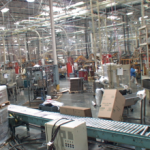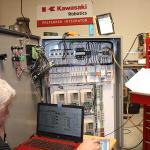It is very common in the industrial sector to have hundreds of feet of conveyor in the building. You can buy good conveyor anywhere used or new. It is repairable and versatile. Where you get into trouble with conveyor is the devices needed to control the conveyor. Let me go through a list.

Other conveyor selection and installation considerations need to be reviewed. You have to power it up first. Generally, conveyor only runs in one direction so you do not have to spend a lot on the motor contactors for each motor. Also in general, conveyors are driven by motors 3hp and below with 1.5 HP and .75 HP being the most common we see. Conveyor gearboxes are usually about 30 to one so you don’t need a huge motor to drive the gearbox. And here is another tip, save money on small conveyor motors by running more than one off a drive or contactor. You can buy a 3HP contactor and run 2x1HP motors without a lot of problems. We do this sometimes when the motors are running 2 sections of conveyor that we want to act as one, such as a corner. For example, you have a conveyor leading into a corner and the corner breaks down. The Lead In conveyor will send product to the floor or other damage without interlocking somehow.
You also have sensors all along the conveyor for letting you know it is jammed or stopped. You don’t want the previous conveyor to be running while the next one is tripped. You will have product everywhere if that happens. Generally we interlock a conveyor to keep this from happening.
If you buy a conveyor system, besides conveyor selection and installation considerations, you need a control box. Here is what is in a conveyor controller:
 DC Power Supplies, AC power supplies, Motor Breakers, Fuses, Motor Contactors, Motor Drives, Overloads, Timing Relays, Simple Relays, Terminal Blocks, Grounding Bars, Safety Relays, Power Relays, Reset Circuits, PLC Controllers, Selector Switches, Start Buttons, Stop Buttons, E-Stop Buttons, Warning Buzzers, Indicator Lights, Din Rail, Wireway, Distribution Blocks, Distribution Fuse Blocks and more. The cost adds up.
DC Power Supplies, AC power supplies, Motor Breakers, Fuses, Motor Contactors, Motor Drives, Overloads, Timing Relays, Simple Relays, Terminal Blocks, Grounding Bars, Safety Relays, Power Relays, Reset Circuits, PLC Controllers, Selector Switches, Start Buttons, Stop Buttons, E-Stop Buttons, Warning Buzzers, Indicator Lights, Din Rail, Wireway, Distribution Blocks, Distribution Fuse Blocks and more. The cost adds up.
If you are considering a conveyor system, the choices out there make this a huge task. Size and weight of product, space restrictions, number of productions lines, integrating with equipment, location of conveyor, safety evaluations, walking safety, power requirements, type of conveyor (Belt/Roller/Chain/Zero Pressure/Merge/Crossovers). Holy Smoke! No wonder conveyor sales people have to know so much! Here at BTS, we have been doing conveyors for more than 40 years. Call us if you need help. (855) ROBOT-99